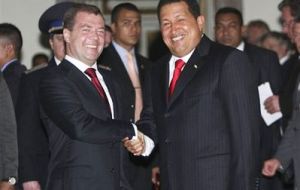MercoPress. South Atlantic News Agency
Medvedev raises Russia's profile in Latin America
 Russia's President Dmitry Medvedev, shakes hands with Venezuela's President Hugo Chavez
Russia's President Dmitry Medvedev, shakes hands with Venezuela's President Hugo Chavez Russian President Dmitry Medvedev agreed to help Venezuela start a nuclear energy program on Wednesday as President Hugo Chavez hailed Moscow's deepening ties in Latin America as a reflection of declining U.S. influence.
It was the first visit to Venezuela by a Russian president, and it came as Medvedev's government raises its profile in a region long dominated by Washington. Medvedev arrived from Brazil, where he announced an upcoming summit with China, India and Brazil to create new rules for the global economy. In Caracas, Russian and Venezuelan officials signed a series of accords, including one pledging cooperation in nuclear energy for peaceful uses. Russia also agreed to work with Venezuela in oil projects and building ships. Chavez, one of Latin America's most outspoken critics of Washington's foreign policy, thanked Medvedev for Russia's role in helping to create a "multipolar" world no longer dominated by the United States. "Russia is playing the role it must play in today's world," he said. Medvedev called Venezuela "one of our most important associates in Latin America" and vowed to continue supplying the oil-rich South American nation with weapons. But he said arms sales to Venezuela "are not aimed against any other country." Sergey Kirienko, head of the Russian Federal Atomic Energy Agency, said Russia is planning to work out a concrete program of nuclear cooperation with Venezuela by the end of next year. "We are ready to teach students in nuclear physics and nuclear engineering," he said through an interpreter. "Research and development in the sphere of geology. Looking for uranium in the territory of Venezuela." Medvedev's visit came as Russian warships, docked in a Venezuelan port, prepared to hold training exercises in Moscow's first major naval deployment in the Caribbean since the Cold War. The military show of force is widely seen as a demonstration of Kremlin anger over the U.S. decision to send warships to deliver aid to Georgia after its conflict with Russia, and over U.S. plans for a European missile-defense system. But U.S. Secretary of State Condoleezza Rice said there is no question the United States retains the "preponderance of power" in the Western hemisphere, despite the Russian warships' presence. Rice told reporters in Washington that "a few Russian ships is not going to change the balance of power" in the region. Chavez backed Russia in its conflict with Georgia, and views the fellow oil producer as a key player in moving toward a world freed from U.S. dominance. He welcomed Medvedev's visit saying it's one step toward "a new world that's being born." The two leaders plan a visit on Thursday to the flagship vessel â€" the nuclear-powered cruiser Peter the Great, the largest in the Russian fleet. Joint naval exercises are planned off Venezuela next week. "There's certainly a political message that Moscow wants to send to Washington, and that is: 'If you meddle in Georgia, we are going to come into your territory.'" It's a simplistic view, but nevertheless that's clearly the signal," said Johanna Mendelson Forman, a Latin America analyst at the Washington-based Center for Strategic and International Studies. During the Cold War, the Soviet Union sent planes and navy ships to Cuba. Nowadays, however, Moscow's motivations are different. Mendelson Forman noted that Russia has growing economic interests, including energy investments and arms deals â€" and she says 80 percent of Moscow's arms sales in the region are going to Venezuela. Chavez's government has bought more than $4 billion in Russian arms, including Sukhoi fighter jets, helicopters and 100,000 Kalashnikov rifles, and more deals for Russian tanks or other weaponry could be discussed by Medvedev and Chavez. "Venezuela holds a primarily economic importance for Russia, in terms of being a major military export destination," said analyst Anna Gilmour of Jane's Intelligence Review. But she said "Russia is not keen to align itself with Chavez' Bolivarian ideology and deliberately avoids making statements regarding political links." Mikhail Margelov, chairman of the Federation Council's foreign affairs committee, denied that Russia's growing presence in Latin America is aimed at challenging Washington. "Russia is not trying to use its relations with Latin America as a counterbalance to the U.S.," said Margelov, speaking to reporters at the presidential palace. "Russia is back in the region. We don't want to intimidate anybody." Russia has shown signs of trying to engage President-elect Barack Obama. Both Russia and Venezuela may also be forced to limit their plans for Latin American investments and aid due to declining oil revenues that have hit their economies during the financial crisis. In Brazil, Medvedev agreed to host a summit of Brazil, Russia, India and China next year to discuss creating a new global financial structure â€" a reflection of how economic power is shifting from the United States and Europe. AP




Top Comments
Disclaimer & comment rulesCommenting for this story is now closed.
If you have a Facebook account, become a fan and comment on our Facebook Page!